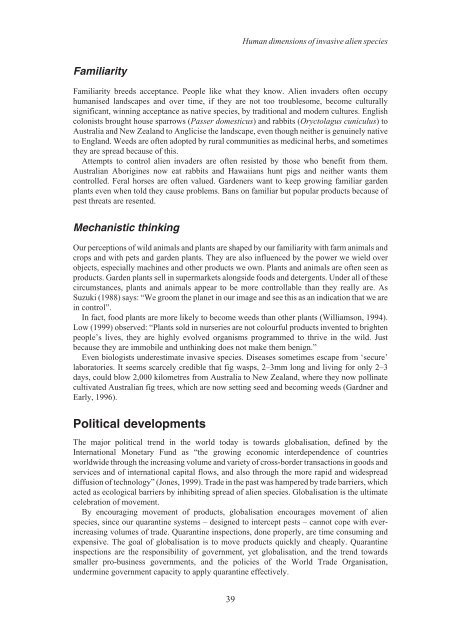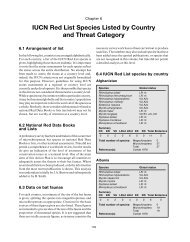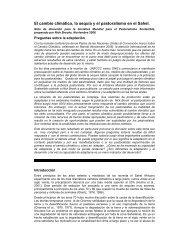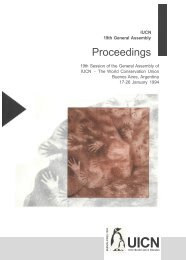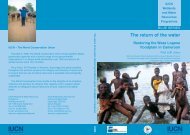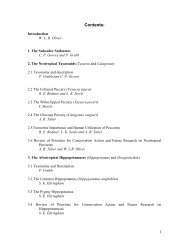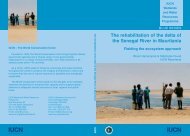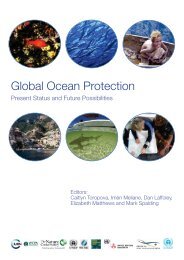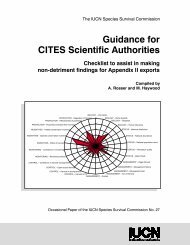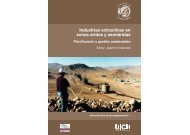Alien Species.vp - IUCN
Alien Species.vp - IUCN
Alien Species.vp - IUCN
You also want an ePaper? Increase the reach of your titles
YUMPU automatically turns print PDFs into web optimized ePapers that Google loves.
Familiarity<br />
Familiarity breeds acceptance. People like what they know. <strong>Alien</strong> invaders often occupy<br />
humanised landscapes and over time, if they are not too troublesome, become culturally<br />
significant, winning acceptance as native species, by traditional and modern cultures. English<br />
colonists brought house sparrows (Passer domesticus) and rabbits (Oryctolagus cuniculus) to<br />
Australia and New Zealand to Anglicise the landscape, even though neither is genuinely native<br />
to England. Weeds are often adopted by rural communities as medicinal herbs, and sometimes<br />
they are spread because of this.<br />
Attempts to control alien invaders are often resisted by those who benefit from them.<br />
Australian Aborigines now eat rabbits and Hawaiians hunt pigs and neither wants them<br />
controlled. Feral horses are often valued. Gardeners want to keep growing familiar garden<br />
plants even when told they cause problems. Bans on familiar but popular products because of<br />
pest threats are resented.<br />
Mechanistic thinking<br />
Our perceptions of wild animals and plants are shaped by our familiarity with farm animals and<br />
crops and with pets and garden plants. They are also influenced by the power we wield over<br />
objects, especially machines and other products we own. Plants and animals are often seen as<br />
products. Garden plants sell in supermarkets alongside foods and detergents. Under all of these<br />
circumstances, plants and animals appear to be more controllable than they really are. As<br />
Suzuki (1988) says: “We groom the planet in our image and see this as an indication that we are<br />
in control”.<br />
In fact, food plants are more likely to become weeds than other plants (Williamson, 1994).<br />
Low (1999) observed: “Plants sold in nurseries are not colourful products invented to brighten<br />
people’s lives, they are highly evolved organisms programmed to thrive in the wild. Just<br />
because they are immobile and unthinking does not make them benign.”<br />
Even biologists underestimate invasive species. Diseases sometimes escape from ‘secure’<br />
laboratories. It seems scarcely credible that fig wasps, 2–3mm long and living for only 2–3<br />
days, could blow 2,000 kilometres from Australia to New Zealand, where they now pollinate<br />
cultivated Australian fig trees, which are now setting seed and becoming weeds (Gardner and<br />
Early, 1996).<br />
Political developments<br />
The major political trend in the world today is towards globalisation, defined by the<br />
International Monetary Fund as “the growing economic interdependence of countries<br />
worldwide through the increasing volume and variety of cross-border transactions in goods and<br />
services and of international capital flows, and also through the more rapid and widespread<br />
diffusion of technology” (Jones, 1999). Trade in the past was hampered by trade barriers, which<br />
acted as ecological barriers by inhibiting spread of alien species. Globalisation is the ultimate<br />
celebration of movement.<br />
By encouraging movement of products, globalisation encourages movement of alien<br />
species, since our quarantine systems – designed to intercept pests – cannot cope with everincreasing<br />
volumes of trade. Quarantine inspections, done properly, are time consuming and<br />
expensive. The goal of globalisation is to move products quickly and cheaply. Quarantine<br />
inspections are the responsibility of government, yet globalisation, and the trend towards<br />
smaller pro-business governments, and the policies of the World Trade Organisation,<br />
undermine government capacity to apply quarantine effectively.<br />
39<br />
Human dimensions of invasive alien species


